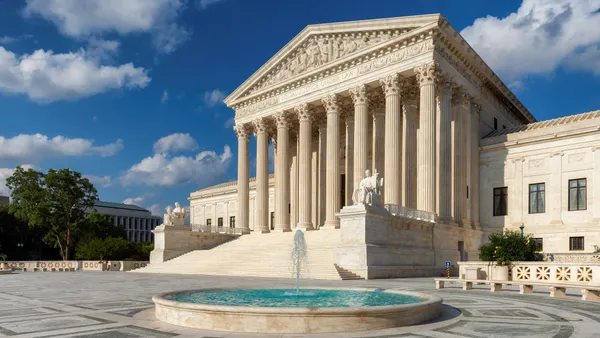Dive Brief:
- Oklahoma’s decision to include 2020 election denial in its latest draft of state social studies standards leaves education experts concerned about the partisan framing of the subject and how this can impact students' analytical skill-building.
- One section of the standards asks students to analyze “the sudden halting of ballot-counting in select cities in key battleground states,” "an unforeseen record number of voters," and “the security risks of mail-in balloting” — all of which are claims that have been proven false.
- While opponents argue that the language of the updated standards is biased, supporters say it equips students to reassess statements from traditional media.
Dive Insight:
“It's disappointing to see a state promote a repeatedly debunked conspiracy theory in its official standards. That should be unacceptable to everyone,” said David Griffith, associate director of research at the Thomas B. Fordham Institute, a conservative education think tank.
A 2021 report from the Fordham Institute ranked Oklahoma highly in a national rating of state standards for civics and U.S. history because of its detailed curriculum and successful defining of analytical skills without replacing historical substance.
Despite the Fordham Institute supporting Oklahoma's previous standards, Griffth said he believes the organization would now give the state a low grade — regardless of how strong the rest of the standards may be.
“A core principle of American democracy is that we accept the outcome of free and fair elections, and if the standards contradict that, then they miss the entire point of civic education,” Griffith said.
The Oklahoma State Board of Education approved the proposed standards late February — although the portion on 2020 election denial was introduced after public review. The standards will now move to the Republican-led Legislature, which may address the changes before the session concludes in late May or pass it along to the governor for consideration.
The state’s updated social studies standards attempt to move away from “radical anti-American curricula” according to a statement from the Oklahoma State Department of Education.
“We’re holding the system accountable and keeping classrooms focused on education, not woke activism,” Oklahoma Superintendent Ryan Walters said in a statement.
Anton Schulzki, interim executive director of the National Council for the Social Studies, said the partisan language of Oklahoma’s proposed standards contradicts the qualities of a social studies inquiry that sets up students to form their own conclusions and critically interact with elements of history. An inquiry should be open-ended and make analyzing of historical events more of an investigation rather than a foregone conclusion condemning the election, he said.
“It's not a good use of class time, because the way it's written, it's already coming up with a conclusion,” Schulzki said.
Additionally, he said that with sources as skewed and biased as seem to be included in Oklahoma’s standards, it is necessary to teach students to examine and assess those sources critically. Schulzki said a more effective inquiry should be based on a broad view of elections and placing those elections into historical context — something that he said is difficult to do for an election held only five years ago.
“You almost have to wait a generation or so to see the historical impact of something,” Schulzki said.
Schulzki said he is unsure if Oklahoma's decision will spark similar actions in other Republican-leaning states but that from an education perspective, he hopes it won't.
Griffith emphasized that Oklahoma seems to be the first to do this, and other states have “chosen not to cross that line.”
Schulzki added that educators are “always the ones caught in between,” noting that standards like these not only put teachers in a difficult position to teach, but they are also bound to have to deal with differing opinions from parents.
Griffith said that implementing these standards ultimately falls on teachers, but while he would have encouraged teachers to implement Oklahoma's previous standards with fidelity, he can't say the same for the updated standards.
“It's very difficult to tell teachers to take state standards seriously when they're promoting election denial,” Griffith said.







 Dive Awards
Dive Awards





